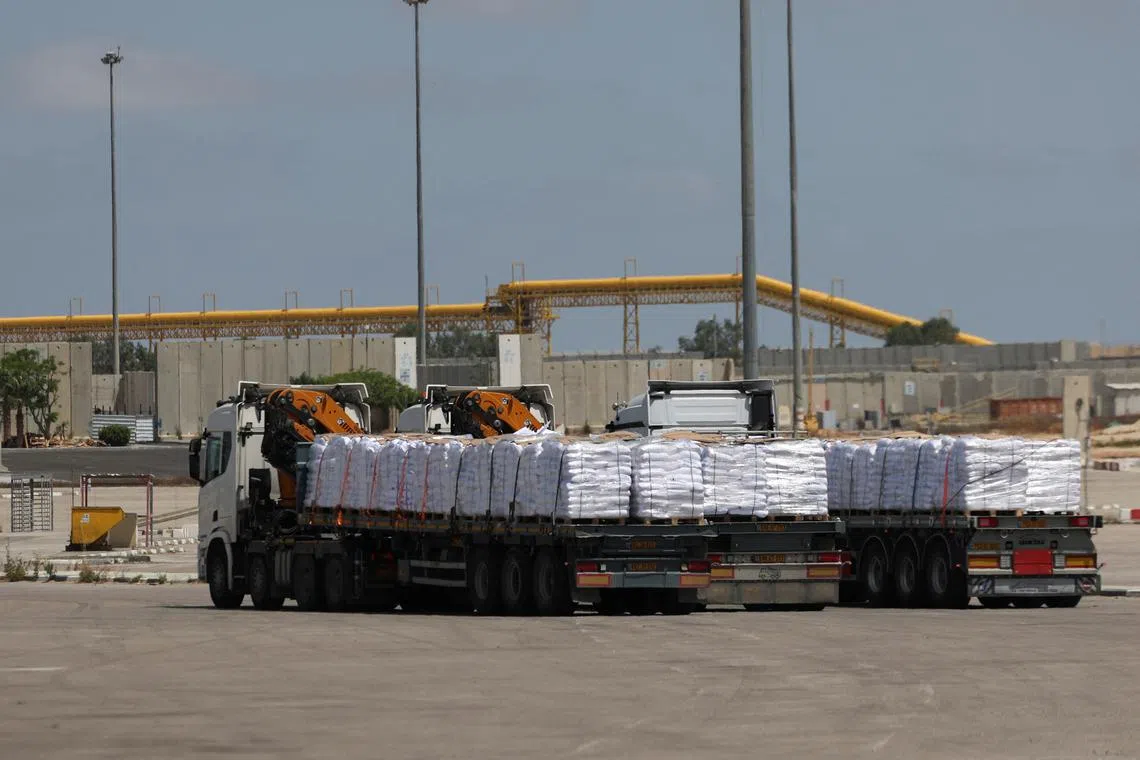News analysis
Why Europe’s criticism of Israel over aid to Gaza is a delicate task
Sign up now: Get ST's newsletters delivered to your inbox

Israeli security forces members standing near trucks with aid entering from Israel into Gaza, near the Kerem Shalom crossing on May 21.
PHOTO: REUTERS
Follow topic:
LONDON – Britain, France and Canada have intensified their criticism of the Israeli government’s actions in Gaza, warning that they will take concrete actions unless Israeli troops “immediately allow humanitarian aid to enter Gaza”.
The three countries, apart from the US, are considered among Israel’s most significant friends.
They issued a rare joint statement on May 19
This was followed on May 20 by Britain’s decision to suspend negotiations on a free trade agreement with Israel.
French Foreign Minister Jean-Noel Barrot also warned that the Association Agreement between the European Union and Israel – a framework document regulating trade between Europe and the Jewish state – could also be called into question.
There is no doubt that, should they wish to take action, the Europeans can inflict a heavy economic cost on Israel.
The Israelis source most of their imported weapons and military technology from the US, but the EU and Britain account for the most significant single share of Israeli trade.
While the outrage at Israel’s behaviour felt in most European capitals is genuine, the recent public condemnations reflect Europe’s helplessness.
The only country that can have a significant impact on Israeli behaviour is the US.
Although there are many signs of growing US frustration with Israeli Prime Minister Benjamin Netanyahu’s policies, Washington remains unwilling to transform its differences with Israel into real pressure.
The Israeli government says that aid is now being allowed into the besieged Palestinian territory of Gaza,
However, aid agencies say that up to 600 food and medical supply trucks are required daily to sustain Gaza’s population of two million. Mr Tom Fletcher, a former British diplomat who now serves as the United Nations humanitarian chief, has warned that up to 14,000 babies could die in Gaza by May 23 if there is no drastic improvement in the delivery of aid.
Under a new and draconian military plan approved by the Israeli government, all humanitarian aid must now be distributed through points controlled by the Israeli military, supposedly because the aid could be stolen by Hamas if distributed otherwise.
The militant Palestinian organisation Hamas has been accused of launching the Oct 7, 2023, strike on Israel that killed around 1,200 Israelis, which subsequently unleashed the current spiral of violence.
International aid agencies reject accusations that their supplies are being misused and refuse to comply with the Israeli demand that Israel’s military should control all their activities.
This is because the demand to control the delivery of aid is connected to another Israeli plan, which aims to drive the population of Gaza to the southern tip of the enclave, with the apparent intent of its total displacement to other Arab countries.
The plan, called Operation Gideon’s Chariots, has already displaced around 100,000 Palestinians.
While Mr Netanyahu says that the operation aims to create “security corridors” for Israeli troops as they pursue Hamas fighters, the reality is that the Palestinians are being pushed around aimlessly, and often with no other objective in mind but to make their lives as miserable as possible and encourage their departure from Gaza.
This objective was made explicit by Israel’s Security Minister Itamar Ben-Gvir – one of the country’s most prominent hardliners – who recently demanded that “the only aid that should enter Gaza is for the purpose of voluntary migration”.
Mr Netanyahu has rejected the criticism levelled at him by Britain, France and Canada, saying that the threat of restricting trade with Israel is a “huge prize” for Hamas.
Yet, British Foreign Secretary David Lammy told Parliament in London during an emergency debate on May 19 that “opposing the expansion of a war that has killed thousands of children is not rewarding Hamas”.
“The world is judging, history will judge them,” Mr Lammy added, referring to Israel’s government.
The real criticism faced by European leaders is that they are too timid in their actions against the Israeli government, which seems oblivious to any ethical and moral considerations.
Yet, there are important reasons why European leaders remain cautious in the measures they are prepared to contemplate against Israel.
One consideration is how to separate criticism of Israel from anti-Semitic outbursts.
Britain’s ruling Labour Party has often suffered from accusations of anti-Semitism.
A famous British TV sports commentator had his contract with the national broadcaster BBC terminated

Trucks carrying aid making their way to Gaza at the Kerem Shalom crossing, on the Israeli side of the crossing, on May 19.
PHOTO: REUTERS
Nor is there a consensus in the EU about freezing trade with Israel; the central and eastern Europeans remain stalwart supporters of the Jewish state.
But the more important European consideration for keeping criticism to a minimum is the desire to avoid a fresh dispute with US President Donald Trump, who has the most significant influence on Israel.
There are plenty of signs that Mr Trump is also annoyed with the Israeli leader.
He omitted Israel from the itinerary of his latest visit to the Middle East.
But the US continues to avoid public criticism of Israel, and Washington continues to say that the plight of the Palestinians in Gaza can be addressed without putting pressure on Israel.
Attending a US Senate Foreign Relations Committee hearing on May 20, Secretary of State Marco Rubio welcomed Israel’s decision to allow some aid into Gaza, telling American lawmakers: “We are pleased to see that aid is starting to flow in again.”
There are also rumours that the US is now planning to pay private companies to deliver food to Gaza through Israeli-controlled corridors, thereby indirectly supporting the Israeli plan to control the distribution of aid to the Palestinian territory.
As long as the US is not prepared to make a stand, all that European leaders can do is vent their frustration while continuing to walk a delicate path between expressing their horror at what is happening and not angering the Americans.
Jonathan Eyal is based in London and Brussels and writes on global political and security matters.


